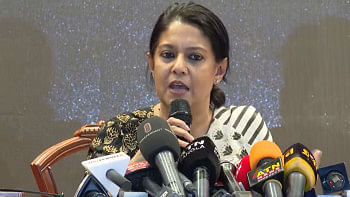Covid-19 Vaccination: Effective also in economic terms

An intense and sustained vaccination campaign can play a pivotal role in Bangladesh's future economic benefits up to more than 10 percent of its current GDP, according to a new report of the World Bank.
The country's gross domestic product (GDP) is projected to be $284.4 billion this year, but the cumulative future GDP gains because of the vaccination will be from 3.6 percent to 10.8 percent of the forecast GDP, it said.
In monetary terms, the cumulative future benefits will be $10.25 billion to $30.74 billion, stated the report titled "South Asia Economic Focus, Spring 2021: South Asia Vaccinates", released yesterday.
"The health and economic benefits from vaccinations greatly exceed the costs involved in purchasing and distributing vaccines for all South Asian countries," said Hans Timmer, World Bank Chief Economist for the South Asia Region, speaking about the vaccination.
"South Asia has stepped up to vaccinate its people, but its healthcare capacity is limited as the region only spends 2 percent of its GDP on healthcare, lagging any other region. The main challenge ahead is to reprioritise limited resources and mobilise more revenue to reach the entire population and achieve full recovery," he said in a WB press statement.
Bangladesh started its mass vaccination campaign in early February with 70 lakh out of 3 crore doses of Oxford-AstraZeneca vaccine in hand. The country is also expected to get 6.8 crore Oxford vaccine doses from Covax for free in different phases.
So far, 53.70 lakh people have been inoculated in the country.
However, the number of vaccine recipients declined in the past few weeks. Yesterday, some 50,752 people were vaccinated whereas the number of per day inoculation in the first few weeks of February was around 2 lakh.
The country wants to inoculate in phases all people aged above 18 years, free of cost.
With only 53 deaths per million people, the country stays in sixth place among the eight South Asian countries in terms of death rate, according to the WB report.
The Washington-based global lender said vaccination against Covid-19 saves lives and livelihoods.
While a lockdown also saves lives, it does so at the cost of economic damage and livelihoods, it said, adding, "With vaccines, there is no trade-off."
It further said if vaccines could have prevented the pandemic, then at least 178,000 lives would have been saved in South Asia and a culminated loss of 23.8 percent of GDP would have been prevented in 2020 and 2021.
The report said the current vaccination campaign in South Asia will prevent a cumulated 15 percent GDP loss in the years 2022 and beyond.
The cost of the vaccination campaign in South Asia would be up to 0.55 percent of GDP in the region. So, apart from the positive health impacts, the economic benefits of vaccination are a large multiple of the economic cost, it said.
The report said the economic benefits of putting shots in the arms of enough people to reach herd immunity (assumed to be 70 percent) greatly exceed the costs involved in purchasing and distributing the vaccines.
Calculating a cost-benefit ratio of vaccination for the South Asian countries, the WB report said, "Vaccination is likely to be a highly cost effective investment for South Asia."
CHALLENGES
The global lender in the report, however, identified some challenges in terms of ensuring a sustained vaccination programme.
"Vaccines are cost effective, yet it is not easy to finance them due to the strict limits on domestic resource mobilisation in South Asia," it said.
Besides, there remains other challenges with regard to health facility access, and the limited number of nurses and doctors relative to the population.
The report said the number of health professionals in South Asia is small relative to the population, and access to services is sharply limited.
All South Asian countries, except Maldives, fall short of the WHO recommended minimum number of skilled health workers -- doctors, nurses, and midwives.
The World Health Organisation recommends 4.45 doctors, nurses, and midwives per 1,000 population; half the region's countries are at less than half that level, it said.
Bangladesh has 0.86 such health workers, it showed.
However, the country has a higher acceptance rate, meaning more people accept a Covid-19 vaccination.
While only 66 percent of adults in Sri Lanka and Pakistan responded yes to the question "If a vaccine for COVID-19 becomes available, would you choose to get vaccinated?" -- the share in Bangladesh is much higher, at 82 percent.
The WB report said effective vaccines will only contribute to herd immunity if people know about them, accept them, and follow the correct vaccination course.
Asked about the WB report, Finance Minister AHM Mustafa Kamal told reporters in a virtual briefing, "We are inoculating our citizens like countries around the globe do. We hope that the impact of Covid will be less when we will be able to complete vaccination."



 For all latest news, follow The Daily Star's Google News channel.
For all latest news, follow The Daily Star's Google News channel. 



Comments